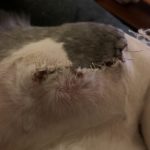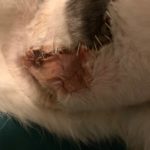Hello,
Well this is a lot of info to go through. First it is always hard for an outside person to assess a situation and the response to that situation. That being said I have never amputated due to infection. Cancer yes. Infection no. Damage to a limb yes. So perhaps that was the issue? If the limb wasn’t functional and it was infected then amputation was prob the best way to go. After that I would talk about culturing the infection to make sure the correct antibiotic is being used. Talk to your vet about this. See what they say. It’s not cheap but it helps to direct the treatment plan.
I have the sweetest Siamese mix, Goldie, adopted from our local humane society. Unfortunately, she has been a sick kitty and she’s had 4 URIs in her two years of life. She did take the full course of antibiotics for all of them and healed successfully.
Recently, she’s been making low snoring noises periodically when awake and sleeping and it seems to be only when inhaling. She’s a talkative girl and sometimes her voice changes when meowing. She has no other symptoms and is eating, drinking and playing normally and there has been no mouth breathing while making the noises. Her breathing rate has been normal. Sometimes it seems like she is making the noises and then stretches out real long in the first picture to get comfortable.
Below is a link to her video around 24 seconds you can hear it, you might have to put it at full volume:
If this is difficult to hear it sounds very similar to this:
I have a vet appointment next week and am concerned she has stertor from an oropharyngeal polyp from my online research and her symptoms. Is this something that a vet would be able to see without putting them under sedation? Are there any other suggestions you have as to what I could have them test for if it’s not a polyp? I wasn’t sure if she could have asthma or another breathing related issue.
Finally, do you by chance have any recommendations for vets in Phoenix, Arizona? I am just getting myself prepared if needed for a second opinion or if surgery is necessary.
Appreciate it and all your tips and videos online! You are doing incredible work!
Comments
I recently adopted my cat, Critter, as he was on my grandma’s farm and had a paw infection. We brought him inside and started him on antibiotics. Unfortunately, the infection did not respond as hoped and he had to have his leg amputated.
After this, he was back to a perky young cat – playing and eating well. A week after surgery I noticed a bump just below the incision. I asked my vet if I should be concerned, and she said not unless it’s hot and that it’s probably a seroma. This made sense to me as he was more active than he probably should have been post surgery.
The next day, that bump burst and started leaking fluid. It was pink and not super cloudy, not smelly or hot. I kept and eye on it all day, and found that it never stopped leaking, so today I took him to the vet. There appears to be a small hole and it’s infected. It’s not at the site of the incision and the incision looks perfect.
He’s on a higher dose of antibiotics now, and some more pain meds as it is tender. He had the wound flushed this morning, and goes again in two days for another flushing.
I guess my question is – is it possible this is the same infection as before? The vets who performed the amputation said they were positive they got any infection (even taking the lymph node), I’m hoping that this is secondary and that maybe the bump was caught on something, or he scratched it open?
ETA: 1st photo is Saturday night, 2nd photo is Sunday afternoon, 3rd photo is today after flushing and rest.
Comments
Is it normal for a cat in heat to have abdominal swelling? My cat is 3 yrs old and we have been meaning to spay her, but she goes into heat so often it’s hard to find time to do it. She is currently in heat and has been for over a week, and last week she had shown asymmetrical swelling on the left and right of her belly. The next day it went down so I figured it was nothing serious and probably swelling from being in heat. Now it has been a week she is still in heat and her abdomen seems just ever so slightly fuller on the right and left and firm. She is crazy in heat and doesn’t show any signs of being sick, acting normal, eating drinking, playing and jumping.
Is it possible for a cat in extreme heat to cause extreme swelling of the ovaries to where they would be palpable? I’m worried it could be early signs of pyometra, or if this is normal with heat. Her cycles have gotten more intense and extreme, as well as longer and more often, which makes me think it could be possible her reproductive system is simply engorged with blood causing it to be palpable.
If that (the swelling) is not normal with heat then I’ll take her to the vet ASAP, but again she is not grossly distended, she just appears “full”. Also there is no chance of pregnancy. Thanks.
Comments
Hi! I have a question about my cat who will be 4 at the end of this month. Sometimes when he stretches, I notice that his rear end (particularly his anus) looks like it is protruding. I thought he had a hemorrhoid but then he stood up and walked like normal and it went “away”. I have another cat and I never noticed this on him. It’s not red, it just looks puffy sometimes. He is eating, drinking and playing like normal. I just want to make sure he is okay and he is not in pain or anything or if this warrants a vet visit. I tend to worry about my boys a lot because I love them so much but I don’t want to be “missing” something. Thank you so much!
Comments
My dog had a grape in his mouth and I managed to take it out I don’t know if he ate more but what else can I do he is playing right eating right will he be okay
Comments
My one year old cat threw up twice on August 23rd, but she was not acting lethargic and was still eating and drinking normally so I thought she maybe threw up because of a hair ball. She threw up again today twice, with one being a very small amount. She is not acting lethargic and is active and playing. She is also drinking normally but she has not eaten as much as normal. Both times she threw up when I was not at home. She did start eating when I got home today though. I also free feed her but haven’t had issues with her vomiting due to eating to fast or vomiting in the entire time I have had her (one year). I’m not sure what the cause of her vomiting could be.
Comments
My 4 month old border collie mix was spay 9 days ago. On day 7 she had a swollen lump under her incision site. I took her to her vet yesterday and it was determined to be a seroma and they said to continue her on crate rest for several more days. I have read that it can take a month or more for a seroma to go down and the fluid reabsorb. She is by nature an extremely active puppy. We play outside for with her for a couple of hours most days, where she fetches balls, frisbees, etc and runs like crazy. We were hoping that after 10 days we could get back to playing. How long do you recommended we wait. The fluid filled lump is about the size of a lemon.
Comments
We have a new puppy, a 9wk doxipoo, he seems extremely lazy and doesn’t ever really want to move unless we make him. Even when he goes to the bathroom, he goes while laying down and it doesn’t seem to phase him? He doesn’t cry or whimper.. just lays there. His eating schedule has been quite unpredictable as well. At first I thought that he just needed an adjustment period to get used to his new people and place but now I’m getting worried. Shouldn’t he be playing more than this? Or at least have some interest in exploring? Should I be worried about Parvo or another sickness?
He came from an in-home breeder and I haven’t been able to get ahold of her since I became worried.
Comments
My 9 month old puppy keeps on chewing his tail relentlessly and chewing his feet. He also sticks both his tail and feet down his throat as far as they will go. When he is playing with toys he keeps squashing them and trying to swallow them whole. He seems frustrated when doing this but he will be playing and then will break away to chew tail or feet. He won’t stop trying to eat EVERYTHING. Three trips previously to the vet to remove large things he has swallowed. He has so much energy and not just normal pup energy.. he does not nap at all through the day. He can go on hours of massive runs through the day and does not even lie down once through the day. Constantly on the go, no off button at all. Becoming quite dominant with other dogs and has started barking at me for attention when he’s not getting any. He has started mouthing people when he meets them, not aggressively but more for attention. He isn’t neutered but people have told me that may be a good start. The behavioural issues are a new thing, he’s been perfect up until the past couple of weeks. Chewing his tail and feet has been going on months. Have been to the vets about it but they don’t seem interested and basically said to think about having his tail docked, he will still attempt to chew what is left so it would never heal!
Comments
So Stella, our almost 3 year old Morkie has some possession aggression issues. Particularly with things like socks or things that don’t have a firm middle when she bites in (like soft stuffed animals). We have tried bribing her with treats and bones, distracting her with play and love, forcefully taking these items from her (that didn’t work well), and finally today we did something that worked! We asked her if she wanted to go “out” to take a “walk” and though he ears perked up she still didn’t drop this stuffed Aflac duck she found in my office. However, once she had her leash on and saw the great outside at the bottom of the stairs she dropped it and never looked back. Do you think this trick will continue to work? Is there anything else we can do when she’s decided something she has a bite on is something she’ll get aggressive about? Thank you all for your insight and help!
















hello Amanda!
If you think your kitty has stertor, or what I call upper nasal snoring sounds, I think it is best to start at your vets office. A couple of things are important to discuss early on. One, lots of stertor sounds alike. For the many cases of polyps that I have seen it is important to look at the whole cat, take a very detailed history and do the basics, like ruling out URI (upper respiratory infection) first. Lots of cats get this, as mist have come through rescue/shelter scenarios. So, I always talk to clients about covering the basics first.
URI should look like infection. Lethargy, fever, ocular and nasal discharge are usually present. Antibiotics are our first stop for these cats. I usually use clavamox, doxycycline, or azithromycin (I’ll even try all three before I move out of the infection suspicion scenario).
BUT, some cats are instead chronic rhinitis. These are usually a little older, and a little distanced from the rescuing phase of their lives. They are usually the somewhat older cats (like 2-6 years old) and they were probably exposed to a herpes virus early on. They sort of never get over the snoring and sniffles. These guys are life long snifflers. Usually with some degree of nasal and ocular discharge.
There are also the polyp cats, These are the ones I see often, because, their primary vet doesnt want to go take a look because if they find a polyp they are afraid to remove it. So most of the cats I see are the suspected polyps who cannot afford the $2500 plus estimate the specialists are giving for retroflex endoscopy, and removal with a surgeon.
I know lots of general practitioners who will sedate (yes this is required to get an adequate look) who will look and will remove but the risks are important to discuss before hand. The risks are; regrowth. I have seen it happen in two cases. Both resolved permanently after the second removal. I have also seen significant bleeding after removal. The cat ultimately did fine, but, I was worried for a few days.
If you find yourself with a vet who is reluctant to look ask for a referral. If the referral is to a specialisit and this is not affordable call the local cat specialty clinics, rescues and shelters for a referral you can afford.
I hope this helps. Please let me know what happens.. If you cannot find help let me know and I can reach out to some of the rescue people I know in AZ.
good luck!
krista
If it is in fact a polyp and it goes without removal, does this lead to any suffering for the cat throughout their life? Do these polyps continue to grow to the point of full obstruction?
I really appreciate all your advice and time! Thank you so much and I’ll report out after the appointment either way.
Hello, I just wanted to follow-up on my vet visit. The vet gave Goldie a Kenalog shot and to be honest, the noises she was making went away, but it’s strange as it seems now I’m not hearing her purr as often. Is a steroid shot ok to use on a limited basis? I know that it’s short term use and would not want to continue giving her shots every few months as I know it can suppress her immunity and for a cat that has had several URI’s I’m now second guessing the vet giving it to her.
Thanks!